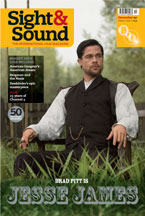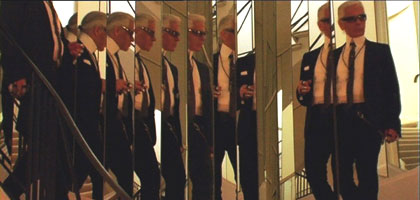Primary navigation

France 2006

Reviewed by Lisa Mullen
Our synopses give away the plot in full, including surprise twists.
Film-maker Rodolphe Marconi shot 200 hours of footage as he shadowed fashion designer Karl Lagerfeld over the course of two years, and the film is an episodic series of intimate vignettes of his life: travelling, entertaining, working on his collections, organising his extensive art collection, mixing with celebrities and rich clients, and at home in his Paris apartment and his country retreat. Excerpts from interviews with Lagerfeld himself provide the only commentary. He reveals certain details about his childhood - an incident of abuse, the lack of warmth shown by his mother - that suggest reasons for his workaholic mentality and controlling obsessiveness.
It's never been difficult to make the world of fashion look silly - quite the opposite. What's tricky is to find a way of acknowledging the cultural clout of the industry without succumbing to dribbling nonsense yourself. In his portrait of Karl Lagerfeld, Rodolphe Marconi works hard to avoid this pitfall, peppering his film with clearsighted observations of the designer's mundane daily round as creative director of Chanel - the gruelling travel, the attention to minute styling details, the difficulty of reading a magazine when you refuse to be seen in public without dark sunglasses. Lagerfeld himself rarely steps over the edge of sense and into fashionista hyperbole: one gets the impression that he leaves that kind of froth to others, preferring to tailor his own world view into a sharper silhouette.
Still, this is no iconoclastic exercise. Lagerfeld is presented as a royal personage stoically shouldering the mantle of his grandeur, sweeping through his kingdom in Cuban heels and limousines, dispensing commands, epigrams and chin-chucking encouragements to his underlings as he goes. Marconi bows and scrapes along with the rest of the courtiers, and there is nothing in his authorised biography that Lagerfeld could possibly object to. Instead, like a favoured puppy, the film-maker revels in his privileged access to his master. And since Lagerfeld turns out to be an extraordinarily clever and monstrously interesting character, the film can hardly fail to be diverting.
Lagerfeld wants us to believe that he has perfected the art of living exclusively on the surface. "I want to be an apparition," he says at one point, "that's the secret of it all." He speaks of his solitariness as "a victory", and states, "I'm not interested in the reality of people." He refers obliquely to the death of a long-term partner from Aids - but refuses to admit to anything as personal as grief - and shares some childhood memories which carefully reinforce his brittle self-image. "My mother was not the abusive type who smothered you in kisses," he remembers. Her reaction to a sexual assault he suffered at the age of 11 or 12 was supposedly typical: "It's your own fault," he remembers her telling him. "Just look at you."
We take it all with a pinch of salt, and we assume Marconi does too, though he never questions Lagerfeld's version overtly. The critique is all in his silence - indeed, the film is full to the brim with absences. Marconi seems entirely uninterested in Lagerfeld as a designer of clothes; none of his employees, acquaintances, rivals or supporters is interviewed. A young, unnamed male model, whom Lagerfeld photographs obsessively in various soft-porn poses, is so silent a presence that he becomes unnerving, perhaps because his very passivity has the power to make the lonely, ageing Lagerfeld both comic and pathetic. Along with Marconi's stark palette and use of monochrome, this wordless commentary neatly drives home Lagerfeld's hard-won emotional sterility and the toll it takes on his life.
But as well as acquainting us with his subject's constructed persona - "part dowager, part robot" - Marconi manages to reveal him as a funny, self-aware and oddly likeable man. Then again, given Lagerfeld's obvious ability to run rings around his pet film-maker, perhaps all we can say is that he reveals precisely what he is allowed to reveal.